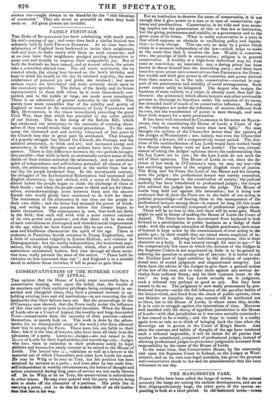FAMILY FESTIVALS.
Tun Duke of Bucemensm has been celebrating with much state his son's coming of age ; and some time back a similar festival was solemnly held by Lord FRANCIS EGERTON. At no time have the aristocracy of England been backward to invite their neighbours, rich and poor, to make merry with them on such occasions ; and at no time have their neighbours grudged putting themselves to some cost and trouble to express their sympathetic joy. But at both the festivals we have named, and at several others, the actors take a somewhat altered tone. The old rustic merriment, the ox roasted whole, the strong beer brewed on the heir's birthday and kept to drink his health on the day he attained majority, the mere exuberance of personal joy and pride, are retained ; but more serious topics are introduced and more seriously dwelt upon in the customary speeches. The duties of the family and its future representative to those with whom he is more immediately con- nected, and to the public at large, are made more prominent. There is an adtnixture of greater solemnity in the mirth. This stately tone more resembles that of the nobility and gentry of England as traced in the reminiscences of Lady FANSHAWE and Mrs. HUTCHINSON, in the times immediately preceding the great Civil War, than that which has prevailed at any other period of our history. This is the doing of the Reform Bill; which has awakened our aristocracy to the necessity of exerting them- selves if they would retain their social precedence. To the same cause the increased zeal and activity witnessed of late years in the Church may also in great part be attributed. That triumph of a popular struggle has forced the Church, the Peerage, and the untitled aristocracy, to think and act ; and increased energy and earnestness in their thoughts and actions have been the conse- quence. There is this difference between the two periods brought into parallel—that while in both an unwontedly earnest sense of the duties of their station animated the aristocracy, and an unwonted spirit of independence and self-reliance pervaded all classes of so- ciety, the aristocracy was first aroused at the earlier time, but in our day the people awakened first. In the seventeenth century, the struggles of the Ecclesiastical Reformation had impressed our English aristocracy, lay and clerical, with a sense of their duties, almost before the people began to claim the discharge of them at their hands ; and when the people came to think and act for them- selves, misunderstandings arose between them and the sincere friends who would gladly have continued to do both for them. The remissness of the aristocracy in our time set the people to their own shifts ; and the latter had attained the power of think- ing and acting to some purpose before the former began to bestir themselves. The consequence is, now, that both are fairly in the field; that each will work with a more correct estimate of its own power and position ; and that there will be less risk of such convulsions as interrupted and retarded social improvement in the age which we have found most like to our own. Earnest- ness and kindliness characterize the spirit of the age. There is pedantry in Puseyism, boyish romance in Young Englandism, not a little of occasional vulgarity in Exeter-Hallism, and violence in Demagogueism : but the sturdy independence, the benevolent aspi- rations, the deep religious enthusiasm, which, after a partial and Sometimes caricatured fashion, find vent through all these secta- rian isms, really pervade the mass of the nation. " Peace bath its victories no less renowned than war " ; and England is in a notable mood to achieve those victories, if left in peace to gain them.


























 Previous page
Previous page